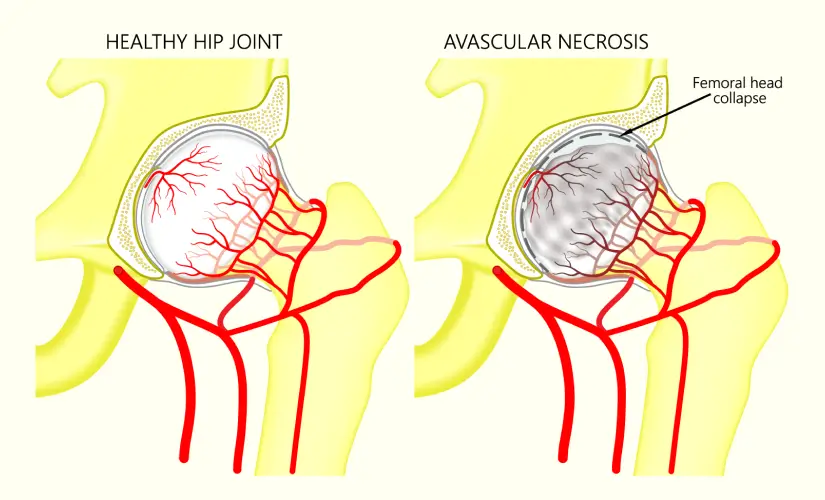-
Doctors
-
Specialities & Treatments
Centre of Excellence
Specialties
Treatments and Procedures
Hospitals & Directions HyderabadCARE Hospitals, Banjara Hills CARE Outpatient Centre, Banjara Hills CARE Hospitals, HITEC City CARE Hospitals, Nampally Gurunanak CARE Hospitals, Musheerabad CARE Hospitals Outpatient Centre, HITEC City CARE Hospitals, Malakpet
HyderabadCARE Hospitals, Banjara Hills CARE Outpatient Centre, Banjara Hills CARE Hospitals, HITEC City CARE Hospitals, Nampally Gurunanak CARE Hospitals, Musheerabad CARE Hospitals Outpatient Centre, HITEC City CARE Hospitals, Malakpet Raipur
Raipur
 Bhubaneswar
Bhubaneswar Visakhapatnam
Visakhapatnam
 Nagpur
Nagpur
 Indore
Indore
 Chh. Sambhajinagar
Chh. SambhajinagarClinics & Medical Centers
Book an AppointmentContact Us
Online Lab Reports
Book an Appointment
Consult Super-Specialist Doctors at CARE Hospitals

Avascular Necrosis (Osteonecrosis)
Symptom, Causes, Diagnosis and Treatment
Avascular Necrosis (Osteonecrosis)
Avascular necrosis affects thousands of people each year. It occurs when reduced blood flow to the bone leads to the gradual breakdown and collapse of bone tissue. Unlike sudden injuries, this painful condition develops gradually over months and years. It typically affects people in their 30s and 50s.
The condition, also called osteonecrosis, targets specific body parts consistently. Most cases occur in the femoral head (hip), knee, talus, and humeral head (shoulder). While symptoms and causes may differ, inadequate blood supply to bones remains the fundamental issue.
Let's explore the nature of avascular necrosis, its diagnosis, treatment options, and signs that indicate you need medical attention. This article offers clear answers that help you understand the condition better, whether you received your diagnosis recently or want to learn more about it.

What is Avascular Necrosis (Osteonecrosis)?
Bone cells die when their blood supply gets cut off in a condition called avascular necrosis. Bone tissue cannot receive oxygen and nutrients without proper blood flow, which leads to bone collapse. This condition affects the ends of long bones most often, particularly the femoral head (hip), humerus (upper arm), knee, and ankle. The condition can develop in any bone and might affect one or multiple bones at the same time.
Avascular Necrosis Stages
The progression of avascular necrosis happens in four distinct stages:
- Stage 1: MRI can detect the condition, but X-rays show no visible damage. Patients might feel hip pain.
- Stage 2: X-rays reveal bone damage with lucency or sclerosis, but the femoral head stays intact.
- Stage 3: The "crescent sign" appears on X-rays - indicates subchondral fracture and bone collapse.
- Stage 4: The femoral head collapses completely with severe osteoarthritis.
Symptoms of Avascular Necrosis
People might not notice any avascular necrosis symptoms at first. The condition progresses, and patients usually experience:
- Joint pain that gets worse, especially during weight-bearing activities
- Pain from the hip to the groin, thigh, or buttock
- Movement becomes limited
- Joints become stiff
- Walking becomes difficult with a noticeable limp
Causes of Avascular Necrosis
Disrupted blood supply to bone tissue causes avascular necrosis. This disruption can happen from:
- Fractures or dislocations from trauma
- Blood vessels blocked by blood clots or fatty deposits
- Too much alcohol consumption
- Corticosteroid medications used for long-term
- Cancer radiation therapy
Risk Factors
The likelihood of developing avascular necrosis increases with these factors:
- People between 30-50 years old
- Men more than women
- Joint injuries from the past
- Medical conditions like sickle cell disease, lupus, or Gaucher's disease
- Decompression sickness from diving
- Long-term steroid use
Complications
Avascular necrosis usually gets worse if left untreated. Here's what it all means:
- Bones collapse permanently
- Joints get severely damaged and develop arthritis
- Untreated joints can be destroyed within five years
- Movement becomes limited with chronic pain
- Joint replacement surgery becomes necessary
Diagnosis of Avascular Necrosis
A full physical examination starts the diagnostic process. Your doctor will check joint tenderness and test how well you can move. Several imaging tests help locate the source of pain:
- X-rays - Basic imaging shows bone changes in advanced stages but misses early disease
- MRI - The most reliable method that reveals detailed bone changes before symptoms show up
- CT scans - Detailed bone and joint images help plan surgery
- Bone scans - Nuclear imaging shows blood flow and bone cell activity
- Biopsy - Lab analysis of tissue samples under microscope
MRI stands out as the most dependable tool that catches avascular necrosis before X-rays can detect it.
Treatment for Avascular Necrosis
The right treatment helps preserve joint function and stops bone damage from getting worse. Your doctor will choose options based on disease stage, age, and affected bone location:
- Non-surgical approaches:
- Pain medications (NSAIDs)
- Crutches or canes to limit weight bearing
- Physical therapy maintains joint movement
- Electrical stimulation encourages bone growth
- Bisphosphonates slow down bone loss
- Surgical options:
- Core decompression - Bone drilling improves blood flow and reduces pressure
- Bone grafting - Healthy bone transplants support damaged areas
- Osteotomy - Bone reshaping reduces stress on affected parts
- Joint replacement - Best option for severe cases with the bone collapse
Stem cell therapy shows promising results that prevent femoral head collapse and improve movement range.
When to See a Doctor
Your condition will worsen without treatment. You should see your doctor right away if you notice:
- Joint pain that rest doesn't improve
- Pain that gets worse with activity
- Movement becomes limited
- You start limping
- You might have broken or dislocated something
Quick medical attention boosts your chances of successful treatment and prevents lasting joint damage.
Conclusion
Avascular necrosis is a serious bone condition that just needs immediate attention. Without treatment, this disease steadily moves through four stages and leads to complete bone collapse and severe joint damage. Early detection of warning signs makes a big difference in how well treatments work.
Avascular necrosis can cause a lot of pain and mobility problems. Medical advances have made treatment options much better now. New treatments like stem cell therapy show promise among other surgical methods. On top of that, simple changes like drinking less alcohol and staying away from high-impact activities help control symptoms.
Patients with ongoing joint pain, mainly during weight-bearing activities, should get medical help fast. Quick action improves your chances to save bone structure and keep joints working well. We have a long way to go, but we can build on this progress as proper medical care helps many patients keep their quality of life and avoid serious complications of this bone disorder.
FAQs
1. Does hip replacement cure avascular necrosis?
Hip replacement doesn't actually "cure" avascular necrosis, but it helps deal with its effects. The procedure:
- Removes the damaged bone and replaces it with artificial joint surfaces
- Gives excellent pain relief that lasts many years
- Brings back normal hip function in advanced cases
Total hip replacement remains the most reliable treatment option if you have collapsed femoral heads and severe pain. The procedure delivers consistent pain relief and good functional results, though patients might need revision surgery later.
2. How fast does avascular necrosis progress?
Each person experiences avascular necrosis differently, but it moves faster than other joint conditions:
- Unlike osteoarthritis, that develops slowly over the years, AVN stages move faster
- The disease takes 12-18 months to progress fully, though some cases develop in just a few months
- Trauma-related AVN moves faster than other types
3. Can avascular necrosis be cured?
No complete cure exists for avascular necrosis right now, but treatments can help manage the condition:
- Early detection through X-rays or MRI allows non-surgical treatments that might slow the disease
- Basic treatments include changing activities, taking anti-inflammatory medications, and doing physical therapy
- Core decompression helps prevent progression during the early stages before bone collapse
- Patients who respond well to core decompression can walk without help for about 3 months
- Surgery becomes the only option that works after bone collapse occurs
Doctors can't cure avascular necrosis without surgery, and non-surgical treatments only help with symptoms temporarily. Most patients with advanced disease (stage III and above) need total joint replacement, which works well for pain relief and improved function.
Still Have a Question?


